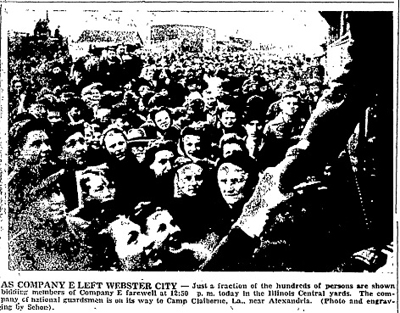Co. E., 133rd Infantry, Webster City, Iowa -- 1941

AS COMPANY E LEFT WEBSTER CITY—Just a fraction of the hundreds of persons are shown bidding members of Company E farewell at 12:50 p.m. today in the Illinois Central yards. The Company of national guardsmen is on its way to Camp Claiborne, La., near Alexandria. (Photo and engraving by Schon).
HEADING SOUTH FOR PERIOD OF WAR TRAINING
Scheduled to Arrive at Louisiana Camp Saturday Morning.
Company E entrained in this city this afternoon for Camp Claiborne, La. A crowd of more than a thousand people were in the Illinois Central yards to see them off.
They boarded a special train, made up of five pullmans, a day coach and two baggage cars. Other units were to join them at Waterloo and Dubuque. The train is scheduled to arrive at the Louisiana camp Saturday morning.
Too Cold for Band
The company marched to the train accompanied by the large crowd of people depot bound to bid them goodbye. It had been planned for the high school band to lead the procession, but due to the cold weather which makes it almost impossible to play most of the horns, this was abandoned.
Des Moines street from Second to the Illinois Central yards was jammed with cars and many were parked in the North Western yards. Cars also jammed the Central yards. While the crowd was large, it was quiet and undemonstrative until the troop train pulled out, when it broke out into hearty cheers and waving of hands.
The company arrived at the train 20 minutes before it pulled out and the soldiers spent the time visiting with relatives and friends.
Recalls Days of 1917
The scene was reminiscent to older people of the days in 1917 when Company C, the headquarters company, and the regimental band left this city. The crowd, however, behaved differently. Today few tears were shed. The “boys” were not “off to war.” In 1917 when the three companies left Webster City, war had been declared. Relatives and friends were anxious and filled with the fear that many of them would never return. Entraining of the companies was a sad affair. And later as the draft quotas left, it was the same way—relatives and friends bid the men goodbye not knowing whether they would ever see them again.
No Emotional Displays
But today, this fear seemed largely lacking.
World War II, is a battle of airplanes and naval units. No one expects United States infantry to leave the borders of the nation, even if this country should get into the war. And so, while relatives and friends regretted to see the boys leave for their far off camp in the south, there was not the tension and display of emotion that accompanied entraining of men in the first World war.
With the government thermometer standing at 14 degrees above zero at noon, the large crowd shivered as it waited in the railroad yards. The temperature, doubtless, had a tendency to lessen the demonstrations that usually accompany the entraining of home troops of soldiers. Everyone, however, shook hands with the fellows and wished them well. And, as the train pulled out, they broke into loud cheers and waved a lusty goodbye.
Two Remain Behind
Although there were supposed to be four officers and 88 men leave on the special train, there were two men left behind. They were Corp. Karl W. Waggoner and Pvt. Carl McCollough.
These men are material witnesses for the state in the cases against Herbert Kneedy and Claude Van, who are accused of assault with intent to commit murder following the recent death of Glen Cook, pool hall employee.
The two guardsmen were eyewitnesses to the fracas in the pool hall in which Cook was struck and fell cutting his head. Permission to remain here and testify at the trials of the two men was granted by Col. Howard J. Rouse, regimental commander, Waterloo.
Are Guests of Officers
There was an extremely small turnout for supper at the company’s mess last evening, the men having been granted leave by Captain Meller to spend the evening with relatives and other friends.
However, Captain Meller and Lieut. M. J. House had a group of businessmen as their guests for the meal. Those present were C. A. Phillips, Phil Estensen, Gustav Nissen, Jerry Fardal, John Oleson, F. G. Snyder, Reed Thompson and Ken Peterson. The well-prepared meal was featured by beefsteak.
Source: Daily Freeman Journal, Webster City, IA – Thursday, Feb. 27, 1941 (photo included)
USE YOUR BACK KEY TO RETURN TO PREVIOUS PAGE.
